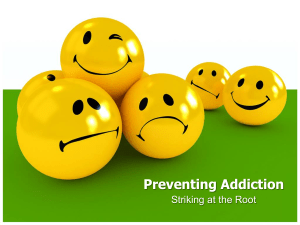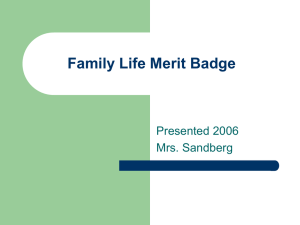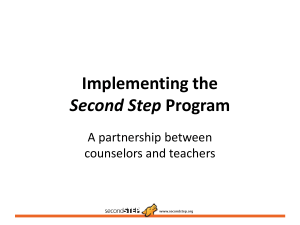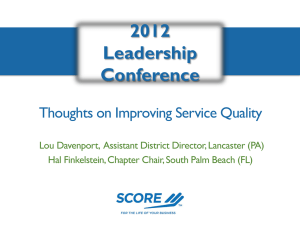Family - FatherHugs.com
advertisement
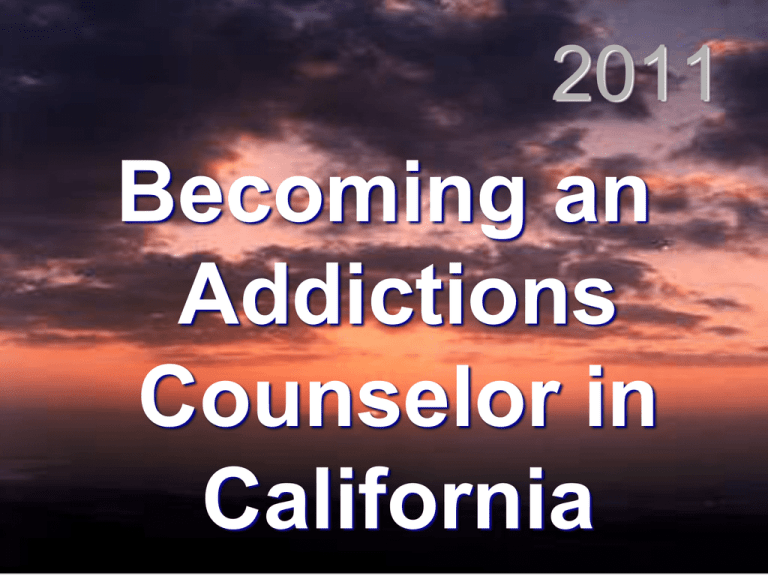
2011 Becoming an Addictions Counselor in California The Process Under control of the California State Department of Alcohol & Drug Programs, commonly known as ADP ADP Under current regulations, there are no requirements to be hired as a counselor. However….. ADP Once hired as a counselor you must become a fully certified counselor within 5 years ADP ADP does not certify counselors. It oversees certifications issued by ten approved, private certifying bodies ADP Alphabetically below: American Academy of Health Care Providers in the Addictive Disorders (AAHCPAD) Association of Christian Alcohol & Drug Counselors Board for Certification of Addiction Specialists Affiliated with the California Association of Addiction Recovery Resources (CAARR) Breining Institute California Association for Alcohol and Drug Educators (CAADE) ADP California Association of Drinking Driver Treatment Programs (CADDTP) California Certification Board of Alcohol and Drug Counselors Affiliated with the California Association of Alcoholism and Drug Abuse Counselors (CAADAC) California Certification Board of Chemical Dependency Counselors (CCBCDC) Center for Criminality Addictions Research, Training, and Application Affiliated with Forensic Addictions Corrections Treatment (FACT) Indian Alcoholism Commission of California, Inc. ADP Once you start working, you must register with one of the ten approved certifying bodies Normally you would register with the organization you plan on using for certification Once registered you should use your registration number on all public displays of yourself as a counselor (business cards, websites, etc.) cont. After Registering, cont. You must have a clinical supervisor at all times. Once registered the five year clock starts ticking, and during this time you must start/finish school, take an approved test from a certifying body, and complete at least 2080 hours of work experience. (some certifying bodies may require more) Which Certification? Each Certifying Organization sets its own requirements The certification you choose may depend on the school you choose; choose carefully! The only classes accepted by all certifying bodies are the ones offered by accredited community colleges and universities. These classes are addiction specific and have transferable units Which Certification? Certifications are divided by high, medium, and low requirements Which Certification? The highest level certification in California is offered by the California Association for Alcohol/Drug Educators Commonly known as CAADE Accredits about 40 community colleges and Universities in California, Nevada and Arizona CAADE certification By far the highest level certification at 36 units (550 classroom hours) Has transferable units that allow you to continue/go back to school and get a degree With financial aid, usually the cheapest way to become certified. Credential: CATC (Certified Addiction Treatment Counselor Medium Certifications 21 units (315 classroom hours) Most well-known is CAADAC (credential: CADC II) Others include: American Academy of Health Care Providers in the Addictive Disorders (credential: CAS-CA) California Association of Addiction Recovery Resources (CAARR) (Credential: CAS) Indian Alcoholism Commission of California, Inc. (IACC) (credential: CSAC) Center for Criminality Addictions Research, Training, and Application ;Affiliated with Forensic Addictions Corrections Treatment (FACT) (out of business: 2012) California Association of Drinking Driver Treatment Programs, CADDTP (CAODC) Lowest Certifications 155 hours of education (10.3 units) Breining Institute (credential: RAS) Association of Christian Alcohol and Drug Counselors (credential: CDAAC) California Certification Board of Chemical Dependency Counselors (CCBCDC) (credential: CCDC) All Certifications Require Fieldwork experience while enrolled in school A signed code of ethics / scope of practice Written exam 40 hours of continuing education every two years What about all these rumors? Silly, ugly, incorrect messages going around What you have just seen is based on the current regulations, which will be in effect for the foreseeable future Trust expert opinion only What about some new laws? Many attempts at changing the current law; none have succeeded Even if a new law is passed it would not go into effect for years Requirements will only go up; safest thing to do is stay in school What Might Happen? ADP might take over certification ADP might issue the credentials, but keep using the certifying bodies to assess readiness and/or do the exams Licensure is likely, but will require a Master’s Degree What Might Happen? Requirements will only go up National trend is for Federal government to require states to require degrees Requirements will only go up What is CAADE fighting for? Higher standards, Higher standards, Higher standards Better salaries for addiction counselors Tiered system of certification that rewards people who stay in school What is CAADE fighting for? Requirements such as full certification for intervention and prevention counselors High standards for the Licensure level Accreditation for all AOD schooling Elimination of criminal background exclusions Grandparenting BTW As a counselor, you are legally and ethically required to report ethics violations You must report to ADP; reporting to the certifying body is optional You can report anonymously, or ask that your name be withheld Failure to do so can result in sanctions for you! (877) 685-8333 (toll free complaint number) The Addictions Counselor of the Future Will be less likely be a recovering addict The Addictions Counselor of the Future Will have more education National trend: degrees The Addictions Counselor of the Future Will be much better trained in Mental Health The Addictions Counselor of the Future Will be well versed in evidencebased practices The Addictions Counselor of the Future Will be familiar with both 12step and non-12step The Addictions Counselor of the Future Will specialize: Special populations Criminal Justice Women Adolescents CODs The Addictions Counselor of the Future Will work comfortably with multidisciplinary staff The Addictions Counselor of the Future Will be comfortable with MAT The Addictions Counselor of the Future Will be familiar with pain management tools, e.g. Suboxone The Addictions Counselor of the Future Will have better continuing education The Addictions Counselor of the Future Will meet a higher standard of care The Addictions Counselor of the Future Will meet a higher standard of ethics ….Substance abuse treatment professionals have the highest rate of ethical violations among all other human service professionals. Certified Addiction Counselors had a 12.4% higher rate of ethical violations compared to Licensed Social Workers, a 17.1% higher rate than Licensed Psychologists, an 18.8% higher rate than Licensed Professional Counselors, and a 26.3% higher rate than Licensed Marriage and Family Therapists. From: “Ethical Violations: A Quantitative Study Comparing Human Service Professions” John Gallagher, MSW, LAODAC, 2008
